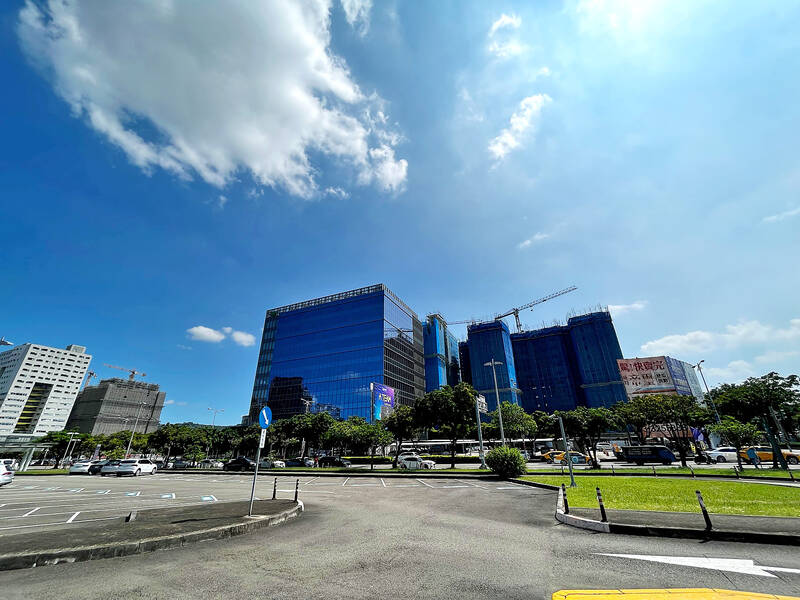Developers and builders last quarter launched NT$458.6 billion (US$14.24 billlion) in presale and new housing projects at record-high prices across the nation while sales rates slowed, a survey by Cathay Real Estate Development Co (國泰建設) found yesterday.
That represented an increase of 57.7 percent from the second quarter when builders postponed product launches amid concern over spiking COVID-19 infections.
Compared with a year earlier, the figure rose 35.2 percent, the quarterly survey showed.

Photo: Hsu Yi-ping, Taipei Times
Asking prices gained 2.99 percent on average to NT$472,300 per ping (3.3m2) nationwide, propelled by higher land, labor and building material costs, the survey showed.
Whether the uptrend is sustainable is a question, as people turn increasingly conservative amid high inflation, monetary tightening and other economic uncertainty.
The price tags are much higher in Taipei at NT$1.04 million per ping and at NT$529,200 per ping in New Taipei City, the survey showed.
Asking prices reached NT$496,600 per ping in Hsinchu County and Hsinchu City, rising 21.25 percent to become the third-most expensive in Taiwan, it said.
Presale and new housing prices grew 4.2 percent to NT$439,900 per ping in Taichung, 16.33 percent to NT$331,100 in Tainan and 6.52 percent to NT$325,000 in Kaohsiung.
In addition, developers and builders grew less flexible about price concessions, which dropped by 0.81 percentage points to 8.12 percent, the survey showed, with the room for bargaining smallest in Hsinchu at 5.44 percent and largest in Taoyuan at 9.49 percent.
The firm attitude reflected confidence on the part of sellers, which slowed transactions, with the average 30-day sales rate weakening 2.44 percentage points to 11.6 percent, the survey said.
Taoyuan had the lowest 30-day sales rate of 9.21 percent, although it improved 0.92 percent from three months earlier, it said.
The sales rate was highest in Hsinchu at 15.63 percent, despite a sharp decline of 13.97 percentage points from the preceding quarter.
Sales rates tumbled 8.53 percentage points to 13.56 percent in Tainan, but gained 1.84 percentage points to 12.09 percent in Kaohsiung.
The figures reflected a cautious attitude among prospective buyers, and the property boom fueled by local technology firms’ investment plans might have plateaued, it said.
In the first three quarters of the year, the market for presale and new housing projects put up a stronger performance compared with the same period last year, it said.
By contrast, the market for existing homes fared weaker, as transactions in the first nine months slipped into negative territory.

UNCERTAINTY: Innolux activated a stringent supply chain management mechanism, as it did during the COVID-19 pandemic, to ensure optimal inventory levels for customers Flat-panel display makers AUO Corp (友達) and Innolux Corp (群創) yesterday said that about 12 to 20 percent of their display business is at risk of potential US tariffs and that they would relocate production or shipment destinations to mitigate the levies’ effects. US tariffs would have a direct impact of US$200 million on AUO’s revenue, company chairman Paul Peng (彭雙浪) told reporters on the sidelines of the Touch Taiwan trade show in Taipei yesterday. That would make up about 12 percent of the company’s overall revenue. To cope with the tariff uncertainty, AUO plans to allocate its production to manufacturing facilities in

TAKING STOCK: A Taiwanese cookware firm in Vietnam urged customers to assess inventory or place orders early so shipments can reach the US while tariffs are paused Taiwanese businesses in Vietnam are exploring alternatives after the White House imposed a 46 percent import duty on Vietnamese goods, following US President Donald Trump’s announcement of “reciprocal” tariffs on the US’ trading partners. Lo Shih-liang (羅世良), chairman of Brico Industry Co (裕茂工業), a Taiwanese company that manufactures cast iron cookware and stove components in Vietnam, said that more than 40 percent of his business was tied to the US market, describing the constant US policy shifts as an emotional roller coaster. “I work during the day and stay up all night watching the news. I’ve been following US news until 3am

COLLABORATION: Given Taiwan’s key position in global supply chains, the US firm is discussing strategies with local partners and clients to deal with global uncertainties Advanced Micro Devices Inc (AMD) yesterday said it is meeting with local ecosystem partners, including Taiwan Semiconductor Manufacturing Co (TSMC, 台積電), to discuss strategies, including long-term manufacturing, to navigate uncertainties such as US tariffs, as Taiwan occupies an important position in global supply chains. AMD chief executive officer Lisa Su (蘇姿丰) told reporters that Taiwan is an important part of the chip designer’s ecosystem and she is discussing with partners and customers in Taiwan to forge strong collaborations on different areas during this critical period. AMD has just become the first artificial-intelligence (AI) server chip customer of TSMC to utilize its advanced

Six years ago, LVMH’s billionaire CEO Bernard Arnault and US President Donald Trump cut the blue ribbon on a factory in rural Texas that would make designer handbags for Louis Vuitton, one of the world’s best-known luxury brands. However, since the high-profile opening, the factory has faced a host of problems limiting production, 11 former Louis Vuitton employees said. The site has consistently ranked among the worst-performing for Louis Vuitton globally, “significantly” underperforming other facilities, said three former Louis Vuitton workers and a senior industry source, who cited internal rankings shared with staff. The plant’s problems — which have not